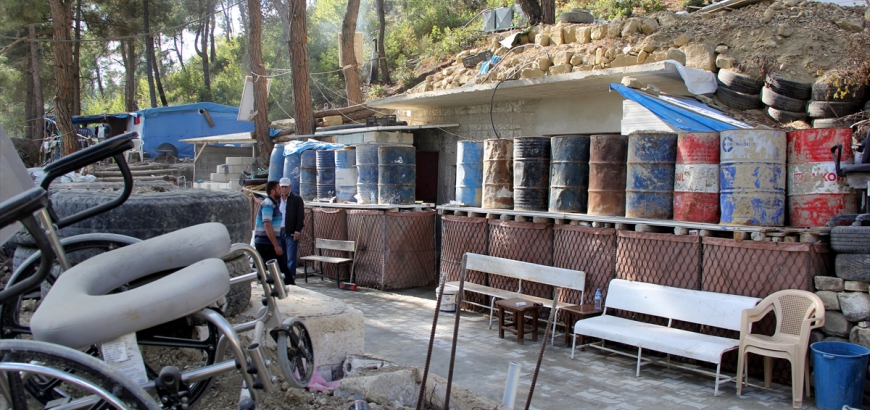The Al-Yemdiyeh Hospital has not stopped delivering medical services to wounded and sick coming from the Lattakia and Idleb countrysides in northern Syria, despite its building being destroyed following two air strikes on the facility.
The hospital has now moved underground in the Jebel al-Turkman region in the northern countryside of Lattakia province, as a fortified center protected from regime and Russian air raids, which do not distinguish between military and civilian installations, according to hospital officials.
Tawfiq Moussa, an official for administrative matters in the Al-Yemdiyeh Hospital, told the story of the hospital, saying that it had been established with the support of philanthropists and had been providing health services for five years.
Moussa told Anadolu that the hospital site had been changed twice over the last six months as a result of the air raids which have destroyed its previous two bases.
“When the hospital was hit by an air strike for the first time, we moved it to the closest point on the border with Turkey, but it was hit a second time, which wounded some of the hospital staff.”
He added that in an attempt to protect the hospital from getting hit a third time, a place was chosen at the foot of mountains and a building was built for it at a depth of 12 meters in order to fortify the center.
Moussa said that the digging operation was carried out by the medical staff on their own.
He said: “The hospital has not stopped providing services for five years. We built the latest building for the hospital on an area of 100 square meters. It includes an operations room, a lab for medical analysis, a room for medical imaging, and a pharmacy.”
The hospital is currently working with a medical team composed of 44 people, including seven doctors, who provide services to people throughout the region, according to Moussa.
He added: “Everything the hospital needs has been set up underground. In this way, it ensures the safety of the medical team as well as the patients. However, we offer services in very poor conditions, like humidity, and there is no electricity current, and so we have to use generators to produce energy.”
Doctor Abou Farqan said that the hospital had been previously hit by “bombardment, and we survived it since we were in the basement.” He said that this bombardment had caused heavy damage to the hospital building, and it lost the ability to provide services. He added that after the strike, “we changed its location before another strike could hit us. Now we’ve dug underground and established a new building for the hospital.”
He continued: “We provide humanitarian services to everyone without distinguishing between Arab, Turkmen, Kurds or Armenians. We don’t ask anyone about their religion, ethnicity or political opinions. The place is for providing humanitarian services and not for holding people to account. The priority is to save human lives.”
This article was translated and edited by The Syrian Observer. Responsibility for the information and views set out in this article lies entirely with the author.


